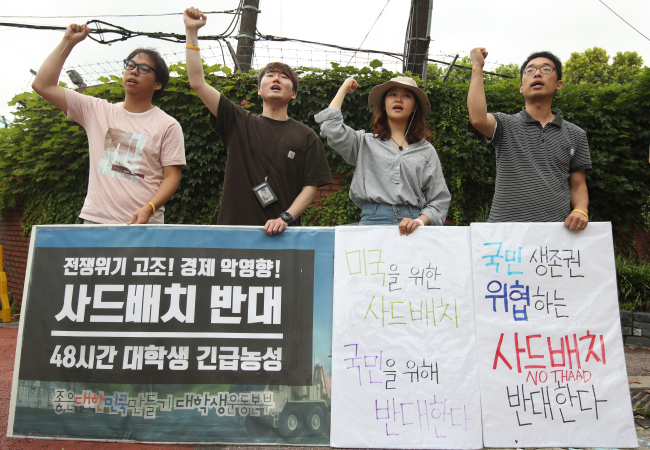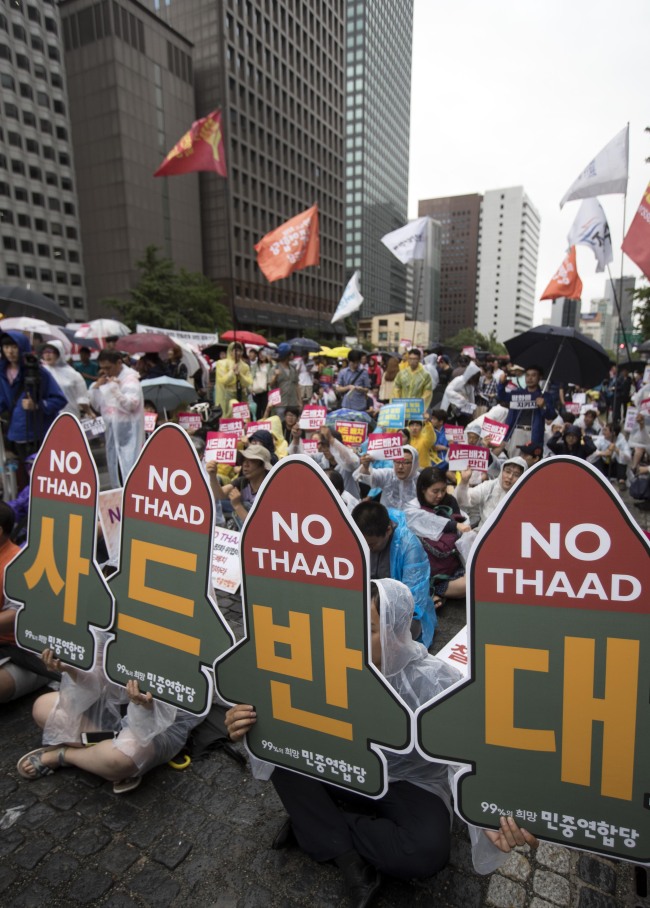The United States will reveal its advanced anti-ballistic missile battery in Guam to South Korean media as part of an effort to alleviate fears about the health risks associated with the system's powerful X-band radar, the military said Sunday.
The tour by reporters planned for Monday comes after Seoul and Washington, following months of deliberation, agreed to station the Terminal High Altitude Area Defense system in South Korea on July 8 and picked Seongju as the location for the weapons system last Wednesday.
The allies said the deployment will greatly enhance South Korea's ability to deal with North Korea's evolving nuclear and missile threats, but local residents in the county, located 296 kilometers southeast of Seoul in North Gyeongsang Province, have opposed the move.
 |
University students voice their objection to the deployment of an advanced U.S. missile defense system, known as Terminal High Altitude Area Defense (THAAD).(Yonhap) |
A defense ministry source said Seoul has been in close consultations with Washington over allowing local reporters to visit Guam so they can check for themselves issues related to the electromagnetic waves generated by the AN/TPY-2 radar, the noise level of emergency generators and the impact on the surrounding environment.
Guam's "Alpha battery" was set up in 2013 to counter Pyongyang's move to operationally deploy the Musudan intermediate-range ballistic missile that could reach the U.S. Pacific territory.

|
(Yonhap) |
"Initially Washington pointed out that it has never allowed any outside civilians to tour its facilities even though it operates these batteries in more than eight countries but has decided to make an exception to show that THAAD poses no threat to health or the environment," he said.
The official said reporters will be able to check various aspects of the battery so they can file fair and objective reports about the concerns being raised in South Korea, and by the Seongju residents in particular.
The battery position was created by clearing a jungle region northwest of Andersen Air Force Base in northern Guam.
The U.S. military said the battery is under the command of the 84th Army Air and Missile Defense Command, and has six truck mounted launchers, a radar and related support infrastructure, and is manned by some 200 troops.
The THAAD system has been specifically built so that it can be sent by C-17 jet transport planes anywhere in the world, and can be sent to South Korea in a matter of hours from the U.S. mainland if the need arises. (Yonhap)





![[Exclusive] Hyundai Mobis eyes closer ties with BYD](http://res.heraldm.com/phpwas/restmb_idxmake.php?idx=644&simg=/content/image/2024/11/25/20241125050044_0.jpg)
![[Herald Review] 'Gangnam B-Side' combines social realism with masterful suspense, performance](http://res.heraldm.com/phpwas/restmb_idxmake.php?idx=644&simg=/content/image/2024/11/25/20241125050072_0.jpg)

